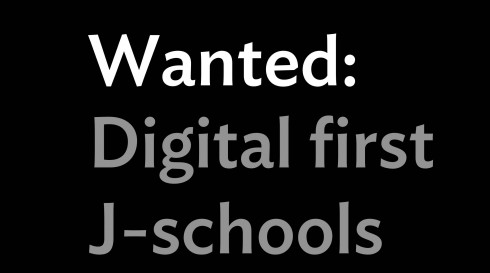Why digital first J-Schools are essential
TAKEAWAY: Whether you tell stories in a TV station or a newspaper and/or magazine, it is all the same: well meaning editors and journalists who practice their craft the way it was long ago. J-Schools need to take the lead to make a difference.

I recently had a surprise chat with a total stranger sitting next to me at a bar during happy hour. When the conversation got us to the usual question “What do you do?”, which comes immediately after two people exchange hellos and tell each other their names, I found out that this man works as a “digital guy” (his own description) in the local TV station for a major national broadcast network.
As the conversation advanced, he had confirmed for me what we already know:
-change is difficult to accept, let alone implement
-“my editors, whom I respect, still think of a news broadcast, as it was 20 years ago.”
-no copy is written thinking of how it will be presented in the digital platforms, it is still written to be read on the air
-“I get frustrated because these veteran editors, who have a lot to offer, simply live in a world of broadcast journalism that doesn’t exist anymore.”
You could be talking to a “digital guy” in a newspaper newsroom, of course.
I now have exchanged a couple of emails with this man, offering links to content that could help him and his colleagues. In one of his last emails, he wrote:
“Today I came to work with your digital first phrase stuck in my head, we will see where it takes us.”
I will be interested to know, too.
It should all begin with the J-Schools
Newsrooms everywhere face the situation described above.
In some cases, the malady is more profound than in others, but the symptoms are the same, and so are the frustrations.
That is why I found a piece by Cindy Royal, a professor of journalism at Texas State University and a 2013-2014 Knight Journalism Fellow at Stanford, so timely and appropriate to this discussion.
Cindy offers some specific ideas to revamp the typical J-School curriculum, with emphasis on digital first. She writes that
“there is a better route, another way to conceptualize an entirely new curriculum around Digital and Data-Driven Communication.”
Here is how Cindy put it:
Most programs have courses at their core that introduce basic skills, things like Media Writing, Media Law and Introduction to Mass Communication. Other programs also require courses in Media History or Mass Media and Society. I propose we flip and reconfigure these courses with a digital emphasis.
This, in essence, approximates what we have been discussing in this blog for quite some time, and the foundation of all our in-house workshops for media organizations globally: make storytelling the key, and not the platforms. But emphasize digital and, if possible, have reporters and editors think of the digital presentation first.
If we wish to take the concept to a more realistic level, and I hope to have the opportunity to do this in a real life setting in the near future, we should recreate in the classroom the same interactions (and tensions) that are so vivid in newsrooms today.
The nexus of storytelling and technology is at the heart of what we should provide in every course taught in a J-School.
In addition, we need to realize that there are four disciplines dominating the discussion: storytelling, technology, marketing/social media and visual presentation.
If a J-School is ready to rethink its curriculum and to shake its foundations to a core, I would say that the four eminent required courses should reflect these disciplines.
It is not enough to simply have an Introduction to Mass Media course (exactly the way I took it as a sophomore in 1967), or the ever so general and ambiguous Writing for the Mass Media.
Instead, the core courses need to address various styles of storytelling and how they adapt to the platforms in the media quartet (and beyond), the role of social media, the impact of technology (we don’t have to train every student to be a coder, however, but it’s becoming a form of necessary second or third language in which we all need to be at least semi fluent), and, the extremely important part of visual storytelling and presentation (the most efficient editors I have ever worked with understood the importance of design).
Newsrooms globally are hungry for people who are well versed in these areas. Most importantly, people who consider themselves storytellers across platforms.
Our previous blog posts on J-Schools
Teaching multi-platform strategies in J School
https://garciamedia.com/blog/articles/pteaching_multi_platform_strategies_in_j_school_p
Role and performance of journalism schools will always be topic of debate
https://garciamedia.com/blog/articles/role_and_performance_of_journalism_schools_will_always_be_topic_of_debate
Reading, ‘riting, ‘rithmetic…and Coding: J-students need coding skills now
https://www.garciamedia.com/blog/articles/reading_riting_rithmetic…and_coding_j-students_need_coding_skills_now
My Impressions of the University of Missouri J-School (video)